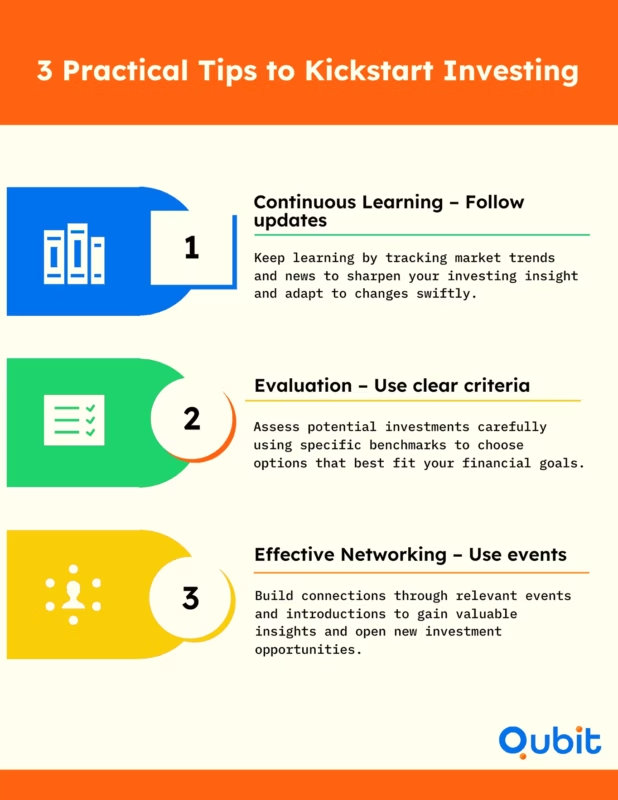Securing venture capital investment can be a transformative milestone for startups aiming to scale their operations and achieve long-term success. This guide is designed to demystify the process, offering actionable steps to help founders attract the attention of investors and secure funding. Whether you're refining your pitch or building relationships, understanding the nuances of venture capital is crucial.
Your understanding of investor relationships is broadened by investor outreach strategies, which provides a conceptual backdrop to the detailed funding steps covered here. With the right approach, startups can turn their vision into reality by aligning their goals with investor expectations. Ready to dive in? Let’s jump right in.
Learn the Basics of Venture Capital
Venture capital investment plays a pivotal role in fueling innovation and supporting high-growth startups. This funding model connects entrepreneurs with investors who provide capital in exchange for equity, enabling businesses to scale rapidly. Venture capital often complements angel investing, where individuals invest their own funds in early-stage companies.
The 37 Angels network exemplifies the rigorous evaluation processes that define successful venture capital and angel investing. With over 20,000 companies assessed and more than 100 investments made, their approach highlights the importance of thorough screening. Entrepreneurs seeking specialized angel funding opportunities can explore 37 Angels for tailored support.
Understanding the fundamentals of venture capital is essential for both investors and entrepreneurs. It not only fosters growth but also drives innovation across industries. By focusing on robust evaluation methods, networks like 37 Angels set a benchmark for effective investment strategies.
How to Tell VC Investors Apart from Angels
Understanding the distinction between venture capitalists (VCs) and angel investors is crucial for founders seeking funding. Angel investing typically involves individuals or groups providing early-stage capital, often from personal funds. In contrast, VCs manage pooled investments from firms or funds, targeting scalable businesses with high growth potential.
Angel investors often focus on smaller financial commitments, with angel network members paying annual dues ranging from $3,000 to $5,000. VCs, however, invest larger sums and play a more active role in scaling operations. Founders can review Angel Investors resources to learn about first-touch engagements during the pitch phase.
Understand How VC Compensation Works
Venture capital (VC) firms typically operate under the "2 and 20" compensation model. This structure includes a 2% annual management fee and a 20% performance-based carry, which represents the share of profits earned from successful investments. While this model is widely adopted, regional variations can impact these percentages. For example, some firms in emerging markets may adjust fees to attract local investors or accommodate smaller fund sizes. Understanding these nuances helps founders grasp the economics behind VC funding decisions.
Your Guide to Startup Investment Options
Exploring startup funding options can be a game-changer for entrepreneurs aiming to scale their businesses. From corporate venture capital (VC) partnerships to individual angel investments, the landscape offers diverse opportunities tailored to different needs. For instance, Airbnb’s early partnership with Sequoia Capital exemplifies how strategic VC backing can transform skepticism into success. Sequoia’s $600K seed investment helped Airbnb overcome doubts about its home-sharing model, ultimately leading to a $4.7 billion IPO valuation in 2020.
Similarly, Uber’s funding journey highlights the power of multi-stage investments. Benchmark Capital’s $1.25M Series A funding enabled Uber to tackle regulatory challenges and expand globally, culminating in an $82 billion IPO valuation in 2019. Emerging trends like sector-specific microfunds—smaller, specialized funds focusing on areas such as climate tech and space—are reshaping the investment spectrum. These niche funds, typically ranging from $50M to $100M, offer targeted support for innovative industries.
Practical Tips to Help You Start Investing
Starting your investment journey can feel overwhelming, but breaking it into manageable steps makes it achievable. Whether you're exploring venture capital investment or angel investing, success often hinges on a blend of strategic evaluation, continuous learning, and building strong networks.

1. Commit to Continuous Learning
Investing is a dynamic field, and staying informed is essential. Regularly read industry reports, attend webinars, and follow thought leaders to understand emerging trends. For example, AI-driven Deal Sourcing is transforming venture capital, with 60% of top VCs using predictive analytics to streamline pipeline management and reduce due diligence time by 40%. Incorporating AI-driven workflows can accelerate investment decisions, giving you a competitive edge.
2. Develop a Systematic Evaluation Process
Before committing to any opportunity, establish a clear framework for assessing potential investments. Focus on factors like market demand, scalability, and the team behind the venture. This systematic approach minimizes emotional decision-making and ensures alignment with your financial goals.
3. Build Effective Networks
Networking is a cornerstone of successful investing. Attend industry events, join investor groups, and connect with entrepreneurs to uncover promising opportunities. Strong relationships often lead to exclusive deals and valuable insights that can shape your investment strategy.
Starting with these practical tips will set you on the path to smarter, more confident investing. Remember, success in venture capital and angel investing is not just about the money you invest—it's about the knowledge, strategy, and connections you build along the way.
Breaking into venture capital (VC) requires a combination of strategic networking, specialized knowledge, and impeccable timing. Building relationships with industry professionals is essential, as connections often open doors to opportunities.
Aspiring VC professionals should focus on developing domain expertise in areas like finance, startups, or technology to stand out. Timing also plays a crucial role; understanding the best time to reach out to investors can refine your approach and align your efforts with industry cycles. With persistence and preparation, you can carve a successful path in venture capital.
Find the Best VC Programs for You
Choosing the right VC programs can be transformative for aspiring venture capitalists and startup founders. Structured learning opportunities, such as accelerators or educational initiatives, provide essential tools to understand market dynamics and investment strategies. These programs often combine mentorship, networking, and hands-on experience to help participants excel in the competitive venture capital space. Whether you're looking to refine your skills or gain foundational knowledge, exploring tailored programs ensures you align your learning with your career goals.
Keep Yourself in the Know with Email Alerts
Stay ahead in the dynamic world of venture capital by subscribing to email alerts. These updates deliver timely insights on VC opportunities, industry trends, and actionable strategies directly to your inbox. Whether you're exploring investment avenues or refining your outreach, email alerts ensure you never miss critical information.
For additional guidance, explore multi-channel investor outreach strategies, which seamlessly blend various communication methods to amplify your investor updates.
How to Tackle VC Funding Obstacles
Securing venture capital can feel like an uphill battle for startups, especially when faced with market skepticism, regulatory hurdles, and fierce competition. Investors often question the scalability of new ideas, demanding clear evidence of market demand and growth potential. Regulatory compliance adds another layer of complexity, as startups must navigate evolving laws that can impact operations or funding eligibility. Meanwhile, competition for VC funding is intense, with numerous startups vying for limited resources. Addressing these challenges requires a strategic approach, including refining your pitch, demonstrating market traction, and staying ahead of regulatory changes. Success lies in preparation and adaptability.
Choose VC Firms That Match Your Goals
Selecting the right venture capital firm is crucial for aligning your startup’s vision with its growth strategy. Focus on firms whose track record, portfolio, and industry expertise complement your goals. Research their past investments to identify synergies with your business model and long-term objectives. This ensures not only financial backing but also strategic support tailored to your needs. To maintain alignment and engagement, explore how to follow up with investors effectively, enhancing communication throughout the partnership.
Use Your Network to Secure VC Meetings
A warm connection can be the key to unlocking valuable investor meetings. Personal referrals and introductions often carry more weight than cold outreach, as they establish trust and credibility from the outset. Building relationships within your network can lead to these critical introductions, significantly increasing your chances of securing time with venture capitalists.
How to Research and Prepare for VC Opportunities
Understanding the priorities of venture capital firms is essential for crafting an effective pitch. Begin by analyzing the firm’s focus areas, such as industries or technologies they specialize in. Review their portfolio to identify patterns in prior investments, including the types of startups they support and typical deal sizes. This insight helps align your proposal with their interests.
Utilizing tools like Fundable can streamline the process. This platform allows founders to create a detailed funding profile, offering an efficient alternative to sending bulky PDF attachments. Sharing your startup’s details through Fundable ensures clarity and accessibility for potential investors.
For enhanced organization, explore strategies like the best CRM for investor management, which introduces practical tools for tracking interactions and improving follow-up processes.
Create an Elevator Pitch That Stands Out
Crafting an elevator pitch that grabs attention requires precision and clarity. Begin by identifying your startup’s unique value proposition and distilling it into a concise, impactful statement. Focus on what sets your business apart and how it solves a specific problem.
Use simple language to ensure your message resonates with diverse audiences. A compelling pitch should leave listeners curious and eager to learn more. Remember, the goal is to spark interest, not to explain everything in one go.
Best Ways to Share Your Pitch Profile
Capturing the attention of venture capitalists starts with presenting your pitch profile in a way that’s both clear and compelling. Begin by tailoring your profile for digital platforms like LinkedIn or startup directories, ensuring concise descriptions and visually engaging elements.
For advance briefings, focus on delivering a succinct overview that highlights your startup’s unique value proposition. Always prioritize clarity over complexity, making it easy for investors to grasp your vision and potential. A well-shared pitch profile can open doors to meaningful conversations.
Write an Executive Summary That Gets Results
An executive summary serves as the cornerstone of any business document, offering a concise snapshot of critical details and unique differentiators. Its purpose is to captivate decision-makers by presenting the essence of your proposal or report in a clear, compelling manner.
A well-crafted executive summary not only highlights your objectives but also underscores your competitive edge, ensuring your message resonates with stakeholders. By focusing on clarity and relevance, you can transform your summary into a powerful tool for driving results.
Build a Business Plan That Investors Love
Crafting a business plan that resonates with investors requires precision and depth. A well-structured plan should encompass market strategy, financial projections, and clear milestones to demonstrate your vision and execution capabilities. Tools like Bizplan simplify this process by centralizing essential elements such as financials and market research into one accessible format.
Investors value clarity and foresight, so ensure your plan highlights growth opportunities and mitigates risks. A comprehensive approach not only builds confidence but also sets the stage for meaningful partnerships.
How to Develop Accurate Financial Projections
Crafting precise financial projections begins with collecting reliable data and analyzing market trends. By incorporating historical performance and industry benchmarks, businesses can create forecasts that resonate with investors. Scenario planning is equally vital, as it prepares organizations for various financial outcomes, enhancing their adaptability. These projections not only guide strategic decisions but also instill confidence in stakeholders, showcasing a well-prepared approach to future growth.
Make a Pitch Deck That Captures Attention
Crafting a pitch deck is about transforming your business plan into a compelling visual story. Start by focusing on the essentials: market size, traction, and funding needs. Each slide should be concise, visually engaging, and tailored to your audience. Highlight your market opportunity with clear data, showcase your progress with measurable traction, and outline your funding requirements with precision.
Remember, a pitch deck isn’t just about information—it’s about capturing attention and sparking interest. Keep it simple, impactful, and focused on the story you want to tell.
Conclusion
Securing venture capital investment requires more than just a solid business plan—it demands a compelling narrative and strategic outreach. Throughout this guide, we explored actionable strategies to craft persuasive pitches and build meaningful connections with investors. By focusing on clarity, storytelling, and tailored communication, startups can significantly enhance their chances of securing funding.
At Qubit Capital, we understand the challenges of fundraising and are here to help. If you're ready to elevate your investor outreach, explore our fundraising assistance services to gain expert support tailored to your needs.
Key Takeaways
• Understand the differences between venture capital and angel investing.
• Recognize the importance of systematic research and due diligence.
• Embrace actionable strategies and data-driven insights for successful investor outreach.
• Align your funding focus with your strengths and market trends.
• Leverage expert tools and the support of Qubit Capital to maximize investment success.
Frequently asked Questions
How to get a venture capital investment?
Securing venture capital investment begins with crafting a compelling pitch deck that highlights your business’s unique value proposition. Research VC firms that align with your industry and goals, and prioritize warm introductions through professional networks. Real-world examples, such as Airbnb’s early pitch, demonstrate the importance of storytelling and market fit.






